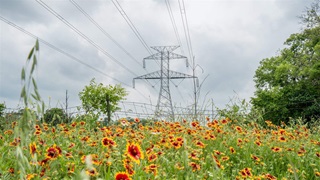How Evidence-Based Solutions Led to Milestones in 2023
Notes from the president
The Pew Charitable Trusts reached some important milestones in 2023, including our 75th anniversary. As we marked the occasion with volunteer work and planned for the future, we also reflected on the values that help us achieve measurable results: innovation, nonpartisanship, and integrity; a focus on impact; a commitment to equity and inclusion; and a true humility in how we listen to—and work with—local communities and other partners.
In this issue of Trust we’re sharing some of the accomplishments we achieved with your support. Among them: Six of the nation’s eight largest banks now offer small-dollar loans, enabling their customers to avoid expensive payday loans, and a new income-driven repayment plan for student loans to make it easier for borrowers to repay their debts and avoid default. Along with our work on other pocketbook issues like retirement savings, where we are helping states expand eligibility for individual retirement accounts, these changes will directly improve people’s lives.
Other milestones from last year are leading toward better care of the natural world, whether through the protection of more than 2 million acres of Australian lands and waters or a historic agreement among nearly 200 nations of the United Nations Convention on Biological Diversity that will, for the first time, protect the high seas—the two-thirds of the ocean outside national borders. Those and other successes for the environment are detailed in this issue.
Each survey from Pew Research Center is a milestone on the path to better understanding each other. And last year saw important, groundbreaking surveys of Asian, Black, and Hispanic Americans that offered new insights into the nuances of how these growing groups of citizens see the world. Other Center studies looked at such bedrock institutions as the American family and the impact of new, transformative technology like artificial intelligence.
A story from Canada in this issue offers another marker of progress. For more than two decades Pew has worked with many partners and stakeholders to preserve Canada’s boreal forest. Last year, leadership of the endeavor was passed to the Indigenous Leadership Initiative (ILI). Indigenous-led initiatives have been essential to the campaign’s success since its inception. The boreal is home to many wildlife species and is an essential nursery for North America’s bird populations, and as a carbon storehouse it plays a global role in managing climate change. Now, as ILI Executive Director Valérie Courtois says in our story, we enter a new era, “one that ensures Indigenous peoples are recognized and supported as the appropriate and natural leaders of conservation on their own homelands.”
We renewed efforts to help states improve how they manage their budgets, plan for the future, and better serve taxpayers. Our work began with a first-of-its-kind 50-state survey to see which states use multiyear revenue and spending forecasts and multiyear stress tests to gauge risks, anticipate shortfalls, and tackle looming challenges to their finances. Pew has long worked with states to help them use data-driven methods to evaluate programs and improve their effectiveness. This new work seeks to outline steps for states on their path to a more resilient financial future.
Writers sometimes say that crafting a narrative is like driving a car at night: You can only see as far as your headlights—but you can make a long trip that way if you just keep going. Through our evidence-based approach and ability to bring diverse perspectives together on some of the critical issues of the day, Pew keeps moving forward and, we hope, provides some illumination to light the way. And as we go, here’s to more milestones in 2024 marking our journey to a better future.
MORE FROM PEW
Explore Pew’s new and improved
Fiscal 50 interactive
Your state's stats are more accessible than ever with our new and improved Fiscal 50 interactive:
- Maps, trends, and customizable charts
- 50-state rankings
- Analysis of what it all means
- Shareable graphics and downloadable data
- Proven fiscal policy strategies
Welcome to the new Fiscal 50
Key changes include:
- State pages that help you keep track of trends in your home state and provide national and regional context.
- Interactive indicator pages with highly customizable and shareable data visualizations.
- A Budget Threads feature that offers Pew’s read on the latest state fiscal news.












